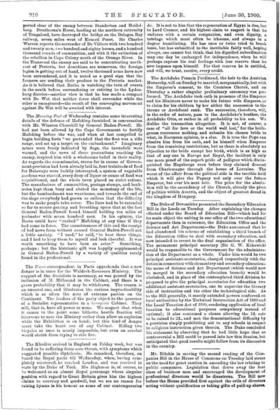The Morning Post of Wednesday contains some interesting details of
the defence of Mafeking furnished in conversation with Mr. Winston Churchill by General Baden-Powell. He had not been allowed by the Cape Government to fortify Mafeking before the war, and when at last compelled to begin building forts "we pretended that the first was a rifle range, and set up a target on the embankment." Imaginary mines were freely indicated by flags, the townsfolk were warned, and the news of these precautions reaching the enemy, inspired him with a wholesome belief in their reality. As regards the commissariat, stores far in excess of Govern- ment provision had been already laid in, four trainloads of food for Bulawayo were luckily intercepted, a system of vegetable gardens was started, every drop of liquor or ounce of food was requisitioned, and the whole town placed on strict rations. The manufacture of ammunition, postage stamps, and bank- notes kept them busy and abated the monotony of the life, but the bombardment was wearisome, and towards the end of the siege everybody had grown so callous that the difficulty was to make people take cover. The lines had to be extended so far to secure grazing and breathing space that at the last General Baden-Powell found himself holding ten miles of perimeter with seven hundred men. In his opinion, the Boers could have " rushed " Mafeking at any time if they had come in force. The consciousness of this and the receipt of bad news from without caused General Baden-Powell not a little anxiety. "I used," he said, "to hear these things, and I had to keep them to myself and look cheerful. It was worth something to have been an actor." Something, perhaps ; but the histrionic gift was happily supplemented in General Baden-Powell by a. variety of qualities rarely found in the professional.


















































 Previous page
Previous page